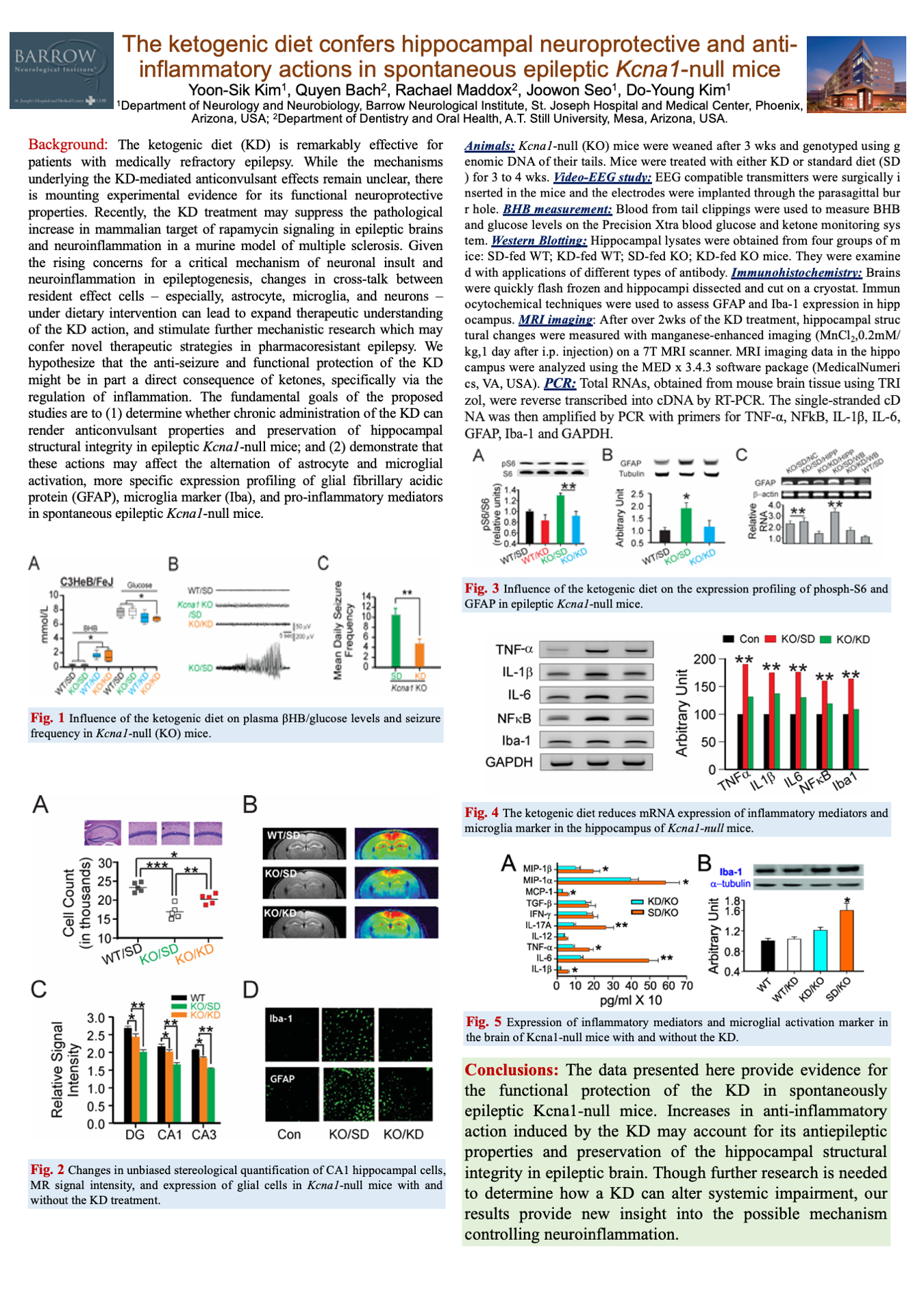The ketogenic diet confers hippocampal neuroprotective and anti-inflammatory actions in spontaneous epileptic
Contributors:
Yoon-Sik Kim
Quyen Bach
Rachael Maddox
Joowon Seo
Do-Young Kim
Yoon-Sik Kim
Quyen Bach
Rachael Maddox
Joowon Seo
Do-Young Kim
Participating Organizations:
Department of Neurology and Neurobiology
Barrow Neurological Institute
St. Joseph Hospital and Medical Center, Phoenix, Arizona, USA
Department of Dentistry and Oral Health, A.T. Still University
Department of Neurology and Neurobiology
Barrow Neurological Institute
St. Joseph Hospital and Medical Center, Phoenix, Arizona, USA
Department of Dentistry and Oral Health, A.T. Still University
Background
The ketogenic diet (KD) is remarkably effective for patients with medically refractory epilepsy. While the mechanisms underlying the KD-mediated anticonvulsant effects remain unclear, there is mounting experimental evidence for its functional neuroprotective properties. Recently, the KD treatment may suppress the pathological increase in mammalian target of rapamycin signaling in epileptic brains and neuroinflammation in a murine model of multiple sclerosis. Given the rising concerns for a critical mechanism of neuronal insult and neuroinflammation in epileptogenesis, changes in cross-talk between resident effect cells – especially, astrocyte, microglia, and neurons – under dietary intervention can lead to expand therapeutic understanding of the KD action, and stimulate further mechanistic research which may confer novel therapeutic strategies in pharmacoresistant epilepsy. We hypothesize that the anti-seizure and functional protection of the KD might be in part a direct consequence of ketones, specifically via the regulation of inflammation. The fundamental goals of the proposed studies are to (1) determine whether chronic administration of the KD can render anticonvulsant properties and preservation of hippocampal structural integrity in epileptic Kcna1-null mice; and (2) demonstrate that these actions may affect the alternation of astrocyte and microglial activation, more specific expression profiling of glial fibrillary acidic protein (GFAP), microglia marker (Iba), and pro-inflammatory mediators in spontaneous epileptic Kcna1-null mice.
The ketogenic diet (KD) is remarkably effective for patients with medically refractory epilepsy. While the mechanisms underlying the KD-mediated anticonvulsant effects remain unclear, there is mounting experimental evidence for its functional neuroprotective properties. Recently, the KD treatment may suppress the pathological increase in mammalian target of rapamycin signaling in epileptic brains and neuroinflammation in a murine model of multiple sclerosis. Given the rising concerns for a critical mechanism of neuronal insult and neuroinflammation in epileptogenesis, changes in cross-talk between resident effect cells – especially, astrocyte, microglia, and neurons – under dietary intervention can lead to expand therapeutic understanding of the KD action, and stimulate further mechanistic research which may confer novel therapeutic strategies in pharmacoresistant epilepsy. We hypothesize that the anti-seizure and functional protection of the KD might be in part a direct consequence of ketones, specifically via the regulation of inflammation. The fundamental goals of the proposed studies are to (1) determine whether chronic administration of the KD can render anticonvulsant properties and preservation of hippocampal structural integrity in epileptic Kcna1-null mice; and (2) demonstrate that these actions may affect the alternation of astrocyte and microglial activation, more specific expression profiling of glial fibrillary acidic protein (GFAP), microglia marker (Iba), and pro-inflammatory mediators in spontaneous epileptic Kcna1-null mice.
